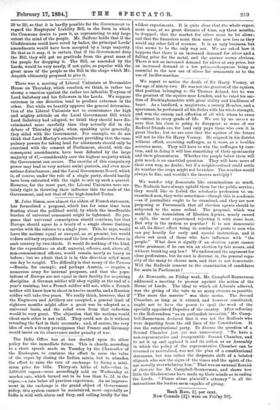M. Jules Simon, now almost the oldest of French statesmen,
las formulised a proposal, which has for some time been -floating about the political world, by which the insufferable burden of universal armament might be lightened. He pro- poses that universal conscription should continue, but that Europe should agree to a treaty of a single clause limiting service with the colours to a single year. This, he says, would leave the nations equal or unequal, as at present, but would reduce military expenditure and the loss of productive force in each country by two-thirds. It would do nothing of the kind, for the expenditure on staff, material, officers, and, above all, non-commissioned officers, would remain nearly as heavy as before ; but we admit that it is in this direction relief must one day be sought. The difficulty is that many of the Powers —Russia, for example, and perhaps Austria, — require a numerous army for internal purposes, and that the popu- lations of Europe are not equal in their facility for acquiring discipline. A German soldier will obey rigidly at the end of a • year's training, but a French soldier will not, while a French soldier will know how to shoot in twelve months, and a Russian soldier will take two years. We really think, however, that if the Engineers and Artillery are excepted, a general limit of eighteen months might after a great war be adopted as a universal basis, and the relief even from that reduction would be very great. The objection that the nations would cheat each other is not valid. They could not do it without revealing the fact in their accounts ; and, of course, the very idea of such a treaty presupposes that France and Germany would insist on its observance under penalty of war.






































 Previous page
Previous page